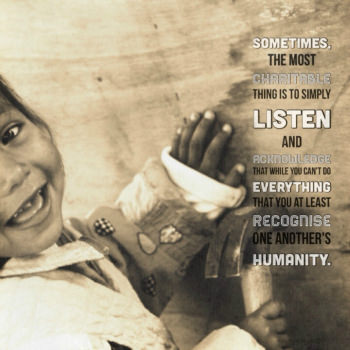 In countries like Australia, the United States, New Zealand and Europe, urban centres tend to have their fair share people on street corners, begging for money, food, accommodation, all manner of things. For years, I've struggled with this. There are so many questions that this situation demands. Why? How do people fall through the cracks, how do we respond? Does giving $2 really help or would $50 be better? Will they simply spend the money on alcohol or will they indeed use it to acquire lodgings for the night? What does the Gospel demand of us? What did Jesus and his followers preach?
In countries like Australia, the United States, New Zealand and Europe, urban centres tend to have their fair share people on street corners, begging for money, food, accommodation, all manner of things. For years, I've struggled with this. There are so many questions that this situation demands. Why? How do people fall through the cracks, how do we respond? Does giving $2 really help or would $50 be better? Will they simply spend the money on alcohol or will they indeed use it to acquire lodgings for the night? What does the Gospel demand of us? What did Jesus and his followers preach?
I listened recently to a Busted Halo Podcast, an excellent resource in which members of the public can phone in with their various questions, and get faith-centred answers from Fr Dave and his colleagues. On this particular episode, a woman phoned in and recounted the story of a woman who had started sitting outside her mass centre, just as people were filing out of 10 o'clock mass in a suburban area.
Those who live in urban areas are perhaps accustomed to seeing beggars by the side of the road, but this lady had placed herself in a position where all of those attending mass would need to drive past her, and choose whether or not to give her money. The caller was frustrated by her response to this woman,and rang into BustedHalo.com asking for advice.
"I feel bad if I give her money, but I feel bad driving away and not giving her money.....and I have a real dilemma here", was the simplified message from the caller.
There are plenty of examples where Jesus calls us to social action. The Good Samaritan story being the most pertinent. But, when we live in urban centres where there really are people in need on every street corner, what does the Gospel ask of us? There was a note of frustration in the caller's voice as she struggled to understand what God was asking of her in this situation.
For years, I have had the same questions. In 2006, it got to a point where I would worry constantly about those on the street, feeling immense guilt and responsibility for each and every person I saw in a situation of poverty. In many ways, listening to this podcast was extremely helpful.
In a beautiful prayer written in memory of Archbishop Romero, the writer says the following: "we cannot do everything, and there is a sense of liberation in realising that, this enables us to do something, and do it well."
We cannot do nothing either. Often we need to seek a balance. There isn't always the luxury of being a Good Samaritan on every street corner, bathing the wounds of the beaten with oil and paying in advance for their lodgings. Many challenged even Mother Teresa on her preference to directly seek out people and care for them, often without an explicit advocacy or justice element. I would argue that we need both. We need the individual charitable response and the social justice advocacy and there is a time for each.
Ultimately, in these situations where we are confronted on street corners and our compassion is challenged, we do well to reach out in conversation and engage in dialogue where time permits. Sometimes, the balm of mercy could come in the form of a muesli bar and a bottle of water....sometimes it could be accompanying the person to a hostel for a warm bed for the night....and other times, the most charitable thing is to simply listen and acknowledge that while you can't do everything that you have recognised one another's humanity.
“You will always have the poor with you”, said Jesus. And if in those moments where we are confronted with these very human situations, perhaps the very best question we can ask is: how can I, within my modern-day context, be the face of Christ to this person.